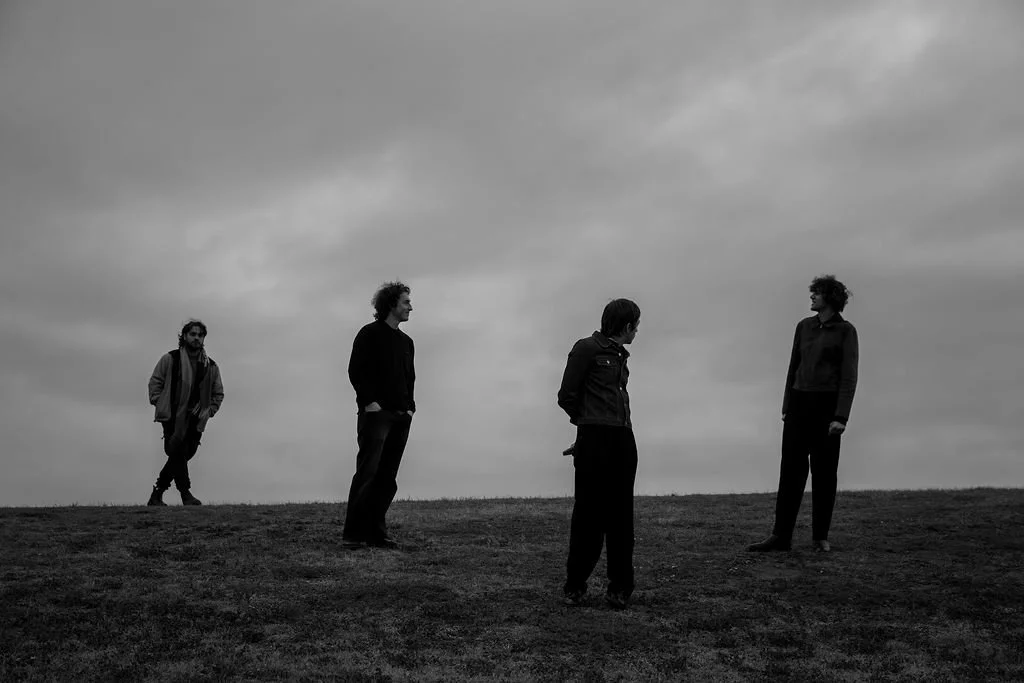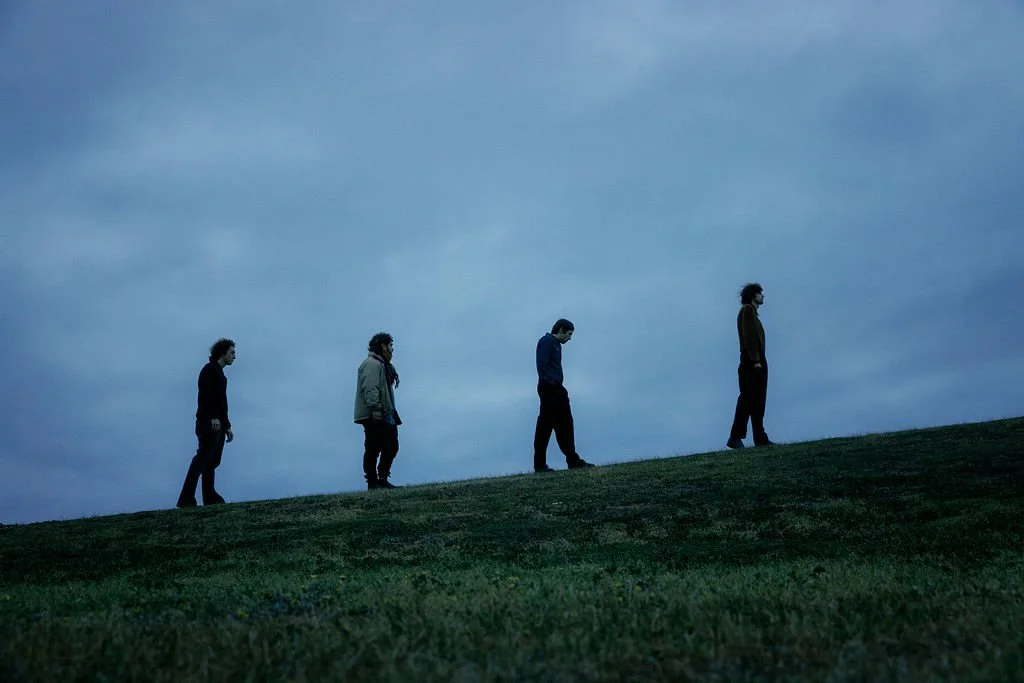UNPACKING TABIS: A LOOK INTO CONVENIENCE STORE’S DEBUT ALBUM
TEMPER DOVE INTO ALL THE NEED-TO-KNOW DETAILS WITH CONVENIENCE STORE about THEIR DEBUT ALBUM TABIS. Across eleven tracks written and recorded in the band’s basement studio, the album shapeshifts, with each song a different kind of disguise, walking the line between deception and truth, artifice and honesty.
Photography: Taylah Chapman
Temper: Jumping straight in- a debut album is such a special release- can you explain the emotions around a first album?
Nick: I think surprise is the main feeling. There's a fundamental shift in the soul of the album once it gets an audience - everything we were feeling towards it in the production stage and awaiting release has changed, often in ways we could never have expected. It's like there's two albums: our unreleased local . WAV files which carry so many private connotations, and then the album that's out in the world and free.
There's not one and the same. Having the lens of other people's interpretations gives the music a different context. All of the minute details we were bogged down by while mixing have a new perspective and everything feels so fresh.
We're very DIY in our process so the album was a private, intimate affair. I was a bit worried about how it would work as this public thing, but seeing people come together over it has retroactively made the music teel more communal and shifted the mood of isolation that surrounded how I used to think about the music. In that way all my memories of making the album are forever changed by its release.
Now that the album is out we have a better sense of what we are, so we've immediately started recording a follow-up. We have a clearer sonic world to exist in and we can deepen it, or even reject it.
Jack: It's really satisfying having an album. There's a mixed feeling for me where I wish we did an album earlier, but I also know that it's important that we waited.
We didn't really have any business making an album until recently, we were still in this amorphous state trying to work out what exactly we were. Though it goes the other way too, where the very mission of making the album forced us to work out what we were.
A lot of it was just condensing the fundamental parts of what has made us a band and going all-in on those things: we like intent and perfectionism - almost treating each track as a film that gets reviewed and edited a million times before it's distributed.
T: How have you felt in the weeks post release?
N: We've felt really happy, not only to have completed a record, but to actually have some people to share it with. It's a really special feeling. I think back to our teenage years when our walls were littered with posters of great albums, but our only desire was to be able to actually finish a whole song. Our skills did not match those intentions at all. We'd spend endless hours trying to create a coherent recording without knowing what to research to make our problems go away.
Our belief in that process didn't really waver though, and now we have an album to share. These last few weeks have been a return to that teenage joy. There's also this feeling of finally proving we exist as a band, but I'm not sure how healthy that feeling is.
J: It's awesome just dumping so many new songs out at once. We're so used to just releasing a single at a time where you're focused on how people are responding to one song, and it can be a weird way to invite people to relate to music - like 'hey check out this three and a half minute thing'. Now it's cool having 8-9 new songs, outside the album singles, that people are responding to all at once.
T: How did you come up with the name Tabis? What connections did you find between the stories you were telling and the split toe shoe?
N: I was interested in how young adulthood seems to be about this arc of attempts at emotional clarification, only to realise as you get older how impossible that clarification really is. There's so many layers of feeling and memory in every glance or utterance that you come across - we're constantly reminded that our interpretations of those things are never the full picture, and that sometimes contradictory interpretations can exist at once.
The tabi shoe - which is this trendy fashion staple - embodied this paradox: the toes are presented as two, but that ornamentation hides what's underneath. The trend of the shoe reflects how we oscillate between different styles, or how we rotate our persona for different contexts. As you are, you realise that not only are other people kind of unknowable but that your sense of self isn't even accurate, because everyone else is just seeing you the way we might see five shoes in a tabi shoe as two. There is a split between you and the other, between you and yourself. Just like the split between the music and the words, the composition and what ends up as the recording. Everything is clarified but nothing is clear.
But since we all experience this feeling, we can connect over it. There's no use getting too lost in analysing it.
We're all caught in this process of trying to simply, and songs are often about trying to share in that simplification.
T: How did you go about the visual storytelling aspects of the album?
J: We always work with our really good mate Jamie Barry on videos. We thought that doing these scuffy, lofi videos would suit the tone of the album way better than anything that was more produced. A lot of it also came down to having Nick lead the videos because they're his songs and a lot gets confused if we're both there trying to interpret them together to make a song. When Nick has the idea for the video it's more instinctual and doesn't really require the pointless middle step of discussing what the music or the video is about.
N: The visual storytelling tries to evoke the facades of classic rock imagery, but also the hazy world of something like a Rothko painting. There's a feeling of a lack of clarity, and of the uncertainty of memory. We love self-taught filmmakers like John Cassavetes or Matt Johnson, and doing really guerilla but expressive stuff.
Photography: Taylah Chapman
T: What was it like working in that capacity as a contrast to creating music?
N: The more disciplined, linear workflow is a nice break trom the erratic, intense way we make music.
Jamie's really professional and practical, freeing us to not have to worry about how to actually make things happen as much.
J: I've made videos and homemade movies since | was about 10, although my understanding and skill in video is basically locked in that period of my life. I think all the movies I made with my friends when I was a kid formed a lot of the way I think about production and music now, of making the most of whatever camera or gear you have but still trying to end up with the most polished thing possible - or something that at least honours the audience/listeners expectations for the medium and what is 'presentable' as finished
T: Were there any unusual recording techniques that were used to create Tabis?
J: There's a mixture of recording techniques that are consciously experimental, and then some stuff that is just our normal process but to most people it's probably really odd or improper technique. In that way the whole project is kind of recorded unusually.
We recorded in an acoustically ugly room and mainly use SM58s across the whole thing, or sometimes our AKG C414 or SM7B. I think like many people I got into Tchad Blake a lot while recording this and was often thinking about processes to take the mix back out of the box and then back in again, or just really bold approaches to how to do the mix.
There's a lot of techniques to try to elevate our home recording job to something that sounds more interesting, like on 'The Ticks' we have this vocal sample in the outro that I reamped through a JC120 amp into the room and recorded with room mics only for a weird distant sound.
Also on that song I read something about the song 'Sex' by the 1975 where the drum room mics were gated in sidechain to the actual kit mics, so as to only open up when triggered by drum impacts. I copied that for the snare on 'The Ticks' - the room mic opens every time the snare is hit. Throughout the outro of that song I also start riding the fader on just the gated room mic to have this additional musical element to play with.
On 'Lost Dog' we also were trying to think of ways to build the track with more ambient layers as it moves into the second verse and final chorus, but in subtle ways that aren't really 'instrumental'. We recorded a pass of cymbals with our live drummer Alex and then I think I used Soothe2 and some EQ to basically remove everything from the cymbals but the overtones. So it's just these weird swells of overtone information in the background that help it build.
There's also a drum machine 'crash' sound in verse 2 that is just a recording of us overdriving our Tascam 244 with feedback and then editing that sound to find a 'crash' sounding bit.
Another one was on 'Twitch Upon The Thread' - there was an earlier version of the song that we scrapped where the main guitar was an electric guitar. I did a weird Blumlein type micing on it that I thought sounded cool and still wanted to use in the song somehow. I was able to take that recording and use it in the bridge section of the song, riding the fader so that it swells up then dips suddenly on the downbeats.
T: We at Temper have been talking about this idea of lost art and the things we lose in the creative process- were there any songs on the album that you'd had sitting but decided to rework?
N: The track 'I Wanna Be Your Dancer' was a high-school era song that marked the first time a song we wrote sounded like a real song and had this pressure to not ruin it. As a result, we have been re-recording it for years long before this album existed, and only got it right now.
All in all we recorded it from scratch three times in the album process and to be honest I'll never be able to listen to it as a finished product. But it was an important step to let something go and have a life rather than suffocate from endless tinkering.
One thing I find cool is that 'The Smiles' has some of the oldest and newest lyrics of the album. Some lines I wrote in about 2016, others towards the end of making the album this year. Generally we treat recording as part of the writing process, and go on a journey with the songs to see where they take us.
J: 'The Smiles' started off sounding a lot more dry, but it didn't really feel interesting enough. We decided it should sound something like 'The Angels if you heard them in a dream'. We mixed it in this really wet verbed-out way, but sometimes I wonder about another world where that song didn't have the reverb all over it.









